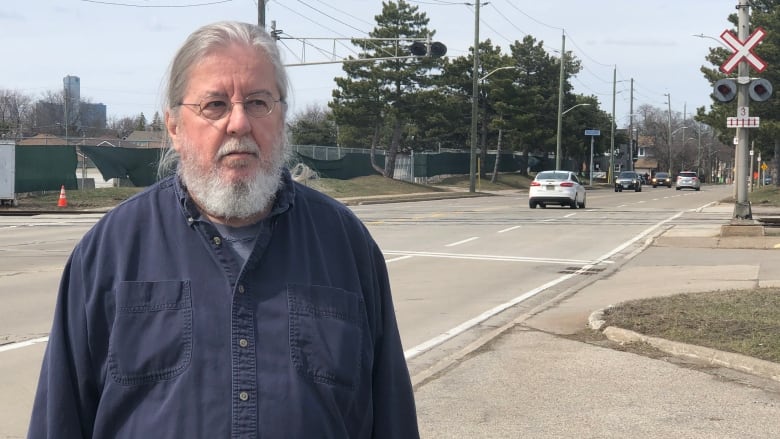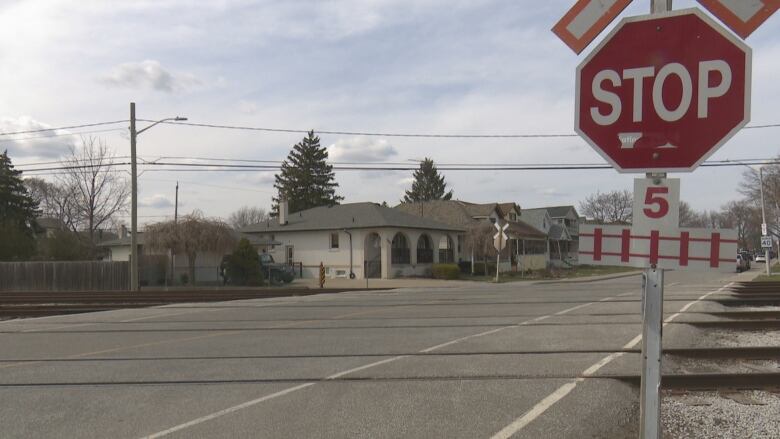In wake of noise complaints, Windsor councillors want to see if Ottawa will pay to upgrade level crossings
Upgrades to level crossings could cost $3 million

A Windsor council committee wants the city took at whether the federal government can pick up the tab on a plan toreduce whistling coming from trains.
Residents in South Walkerville have recently complained to Ward 4 councillor Mark McKenzie about an increase in the number of times Essex Terminal Railway(ETR) trains have been blowing their horns at level crossings in their neighbourhoods.
McKenzie who proposed the motion atWindsor council's standing committee on transportation, environment and public safety also wants more information on the decibel levels of the train whistles.
One South Walkerville resident, John West, said in an interview prior to the meeting that the noisestarted in October of 2022.
He says the train whistles can sometimes be heard as late as 1:30 a.m. and as early as 6a.m.
Transport Canada says it is aware of the complaints and has communicated them to ETR.

By law, trains have to use their horns when passing public crossings.
"While the department understands that whistling can be bothersome for people living close by, whistling is one way to keep drivers, cyclists and pedestrians safe when using public railway-roadway grade crossings," a Transport Canada spokesperson said in a statement.
"The sounding of an engine bell or a train whistle is the only warning device that train operators have at their disposal to alert any persons on, or near the tracks of an approaching train."
West is calling for a number of alternatives including a system of warning lights at crossings that eliminate the need for trains to blow horns. Trains must blow horns at crossings that don't include guard arms that come down to stop traffic when a train is approaching.
West attended the standing committee meeting virtually Wednesdayand had planned to make an 11-page submission to the committee, but due to technical difficultieswasn't able to present as a delegate on the issue.
He was invited to return for the meeting when council further discusses the issue.
A report by transportation planning senior engineer Jeff Hagan states that to upgrade level crossings with the equipment would cost around $3 million each.
But West says there are cheaper alternatives.
"In Alaska they had the same issue. There are warning lightsthat show when a train approaches. Engineers do not have to use the horns, and there are the safety upgrades and various other recommendations," said West, who lives on Lorraine Street.
In January, city council passed a resolution directing administration to meet with ETRto initiate a process to request train whistling be limited and used only if absolutely necessary on lines located east of Howard Avenue and West of Walker Road.
Hagan reports thatETR officialsrejected a suggestion that nighttime operations cease due to concerns it would affect their operations and revenue.
ETR also indicated that their horn volumes are regularly measured and adjusted to be as close as possible to the federally regulated minimum levels.
They agreed, however, to looking into the possibility of placing horns on the underside of locomotives rather than on top to minimize the noise experienced in neighbourhoods.
At the meeting Wednesday, a representative of ETR said federal rules mandate the horn be on top of the locomotive, so moving it below the train is not an option.
Committee chair Fabio Costante said in an interview prior to Wednesday's meeting thatthere may be some "low hanging fruit" that council could explore to mitigate some of the issues but he is not optimistic the horn blowing can be reduced without a heavy cost to the taxpayer.
"The way that the report is drafted it, it appears as though the options are somewhat limited and very expensive," said Costante.
Hagan reports that at least two crossings Benjamin Avenue and Hall Avenue would cost the $3 million to upgrade.
He added that"it is likely that other crossings along the corridor would need upgrades to meet the standards for whistling cessation."












_(720p).jpg)


 OFFICIAL HD MUSIC VIDEO.jpg)
.jpg)



























































































